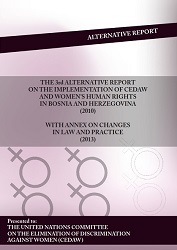The 3rd Alternative Report on the Implementation of CEDAW and Women’s Human Rights in Bosnia and Herzegovina with Annex on Changes in Law and Practice
The 3rd Alternative Report on the Implementation of CEDAW and Women’s Human Rights in Bosnia and Herzegovina with Annex on Changes in Law and Practice
Author(s): Aleksandra Petrić, Fedra Idžaković, Gordana Vidović, Natalija Petrić, Mara Radovanović, Diana Šehić, Sabiha Husić, Selma Hadžihalilović, Sadžida Tulić
Contributor(s): Ivona Kristić (Translator), Edita Miftari (Translator)
Subject(s): Gender Studies, International Law, Human Rights and Humanitarian Law, Civil Society, Governance, Politics and law, Social development, Social differentiation, Sociology of Law
Published by: Sarajevo Open Centre
Keywords: Human rights; Bosnia and Herzegovina; women’s rights; gender studies; gender equality; implementation of CEDAW; women’s human rights; law; politics; discrimination;
Summary/Abstract: BiH is still burdened by ethnic and national divisions, which hinder the social, economic and political development, and dominate the public discourse. Thus the issues of gender equality, realization of women’s human rights in public and private spheres, and the application of domestic laws and international obligations, including the Convention on the Elimination of All Forms of Discrimination against Women (CEDAW) have been pushed into the background. Despite the progress that has been realized in regards to development of the formal and legal framework and public policies in the field of promoting and protecting women’s human rights, women in BiH do not have equal opportunities to participate and are underrepresented in political decision-making within the legislative, executive and judicial authorities at all levels. The State has failed to ensure the harmonization of the BiH Election Law with the Law on Gender Equality in BiH. Women have been excluded from the processes of negotiations, peace processes, post-war reconstruction and the European integration process, which remain exclusively reserved for men. Discrimination against women continues to be deepened and maintained by appointing men to managing positions in public companies and steering boards, as well as executive bodies in the economic sector. Institutional mechanisms for gender equality in BiH remain largely isolated within the institutions of the system due to a lack of understanding of their role and resistance to issues of gender equality and women’s human rights. BiH has not invested real efforts to ensure the positioning of the Gender Equality Agency of BiH as the institution that would be directly responsible to the Council of Ministers. Additionally, there are no tangible results in practice regarding raising awareness and building capacity of government bodies at all levels on implementation of CEDAW.
- Page Count: 126
- Publication Year: 2013
- Language: English
- Introduction
- Content File-PDF

